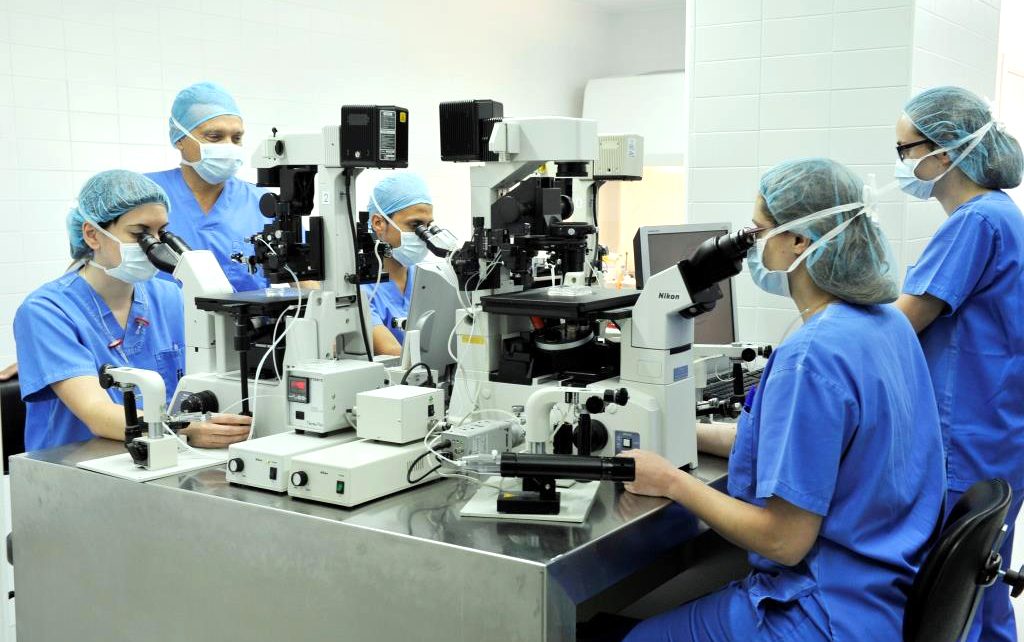
Security in the IVF laboratory in times of coronavirus
Given the current global situation due to the coronavirus pandemic, IVF laboratories around the world have closed their doors. At Instituto Bernabeu we follow a strict protocol for the maintenance of equipment and frozen samples during these days of isolation.
When this situation is resolved, we will reopen our doors to continue fulfilling our mission: helping our patients become parents. When laboratories are able to reopen, the process will be as if it were a newly opened laboratory, following the steps to ensure the perfect operation of the embryology unit:
- Cleaning and disinfection of walls, ceilings, floors, furniture and surfaces all over the laboratory.
- Cleaning, disinfection, set-up, tuning and validation of all the equipment in the assisted reproduction laboratory.
- Renewal of all disposable materials used in laboratory equipment.
- Order new culture mediums and pH tests.
At Instituto Bernabeu’s IVF laboratories, all work is carried out following a strict biological safety protocol, according to which we treat each sample and biological fluid that arrives at the laboratory as if it were potentially infectious.
The biological agents that we come into contact with in the IVF lab are classified into 4 levels, according to their danger:
- Group 1: do not cause serious illness.
- Group 2: biological agents that cause disease, but there is no risk of contagion and with effective treatment.
- Group 3: When the pathogen causes serious illness, can be transmitted to others, but it has effective treatment, for example, the flu.
- Group 4: when it causes serious illness, it is contagious and there is no effective treatment or prophylaxis. This would be the case of coronavirus at present.
To deal with a possible biological material infected by any of these pathogens in the IVF laboratory, we have basic biological safety elements that eliminate the risk that these cause, protecting workers and other biological material that is in the laboratory faced with a possible infection.
In the case of our IVF laboratories, the level of safety in which we work is level 3, which means that we face infectious agents that cause serious diseases, which can be transmitted by aerosols (when in contact with people infected or in the laboratory when processing infectious samples).
The security features in the lab are divided into 3 groups:
Standard protocols and good practices in daily work, as well as properly training of people who have contact with potentially infectious samples. These protocols are in writing and periodically reviewed, and include actions such as:
- All processes and treatments are carried out in sterile and aseptic conditions.
- Patients and biological samples are separated in space and time in the operating room as well as in the lab.
- Work surfaces are cleaned after each procedure that is carried out.
- The lab is cleaned daily.
- Biological remains are disposed of separately in special containers.
- Both patients and staff have routine serology screening.
- Access to the lab is restricted and its doors are always closed.
- Sharp objects are always single-use and disposed of separately in special containers.
- All disposable material is sterilized and used one time.
- Reusable material is disinfected and sterilized in an autoclave.
Safety equipment and primary barriers: guarantee that procedures that are carried out are done so with the utmost safety. These barriers can be part of the laboratory equipment itself, or the personal protective equipment (PPE) that we always use. For example:
- Flow cabins type I and II to process all biological samples.
- Protective goggles and gloves used while handling samples that can spill or splatter.
- Single-use mechanical handling tools for sterile samples.
- Closed freezing straws providing the highest biological security.
- Specialized clothes for use in the lab and operating area that is cleaned daily.
- Disposable caps, mask, shoe covering and gloves.
Secondary barriers that are designed along with the lab and operating areas that ensure sterility and separation of each work area. These barriers include:
- Clearly marked and restricted access to the lab and operating rooms.
- Physical separation of work areas.
- The air from the operating room and laboratory areas is filtered for maximum purity. There is also a positive ventilation system, which prevents the entry of outside air into the laboratory area.
Now more than ever we must follow biosafety protocols and preventive measures that we have summarized, which prevent the possible transmission of this new infectious agent, and which we always apply in the IVF laboratory, to protect both ourselves as workers and Instituto Bernabeu patients and their biological samples.
Dr Jorge Ten, Director of the Reproduction Biology Unit at Instituto Bernabeu
